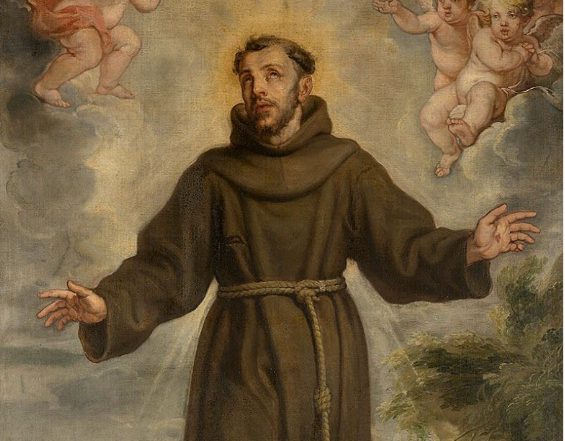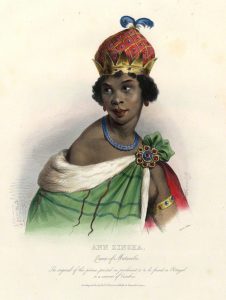Winner of the Spring 2019 StMU History Media Award for
Best Article in the Category of “People”
Francis was faced with a very large obstacle: while he was trying his hardest to pursue what he found to be his vocation, the hate that welled up in his father proved to be a major issue in his passage to that calling. Even though Francis knew without a doubt that he could easily become a very successful merchant, he felt an even stronger gravitation towards another life. Indeed, he felt called to a life that would constantly require to him to put the skills he gained from shadowing in his father’s work and provide him with an even stronger fulfillment in his life, despite it being very much against the social standards of his community and the wishes of his father. While his father saw his choice as an acceptance of failure, Francis saw it as an answer to the call of something greater than anyone could have ever imagined.
In Assisi, Italy, lived our character, Francis. Francis was born in 1182 to Pietro and Pica Bernardone. Throughout his childhood, Francis proved to be a very charming and popular young boy, as he was well liked by many children in his area, and was constantly followed by a group of friends. At home, Francis’ parents were very caring for him and constantly tended to all his wants and needs. His father was a very successful textile merchant, a career that made him and his family wealthy, while Francis’ mother stayed at home with him and did house work, including serving Francis, making him the center of her life, her pride and joy.1 Francis was well set with a large group of friends and two parents that loved to spoil him.2 When Francis was of age, he went to work with his father to learn the business of a merchant. Francis, as it turned out, was a natural, and caught on to the trade very well. After a short time, he began showing signs of a bright future as a textile merchant.
Merchants in Francis’ time were those that traveled long distances in order to exchange goods in various lands with various people. Textile merchants, the kind of merchant that Francis’ father was, tended to sell a great amount of goods and generally made very large amounts of revenue from their sales. Merchants were also well known for influencing the spread of culture and religion to those that they sold to, as they needed to be very persuasive in order to make sales, and were naturally found to do the same with their lifestyles. As a result, Francis quickly learned not only how to sell goods, but how to teach as well. The skill of spreading and teaching customs, language, and especially religion would greatly influence Francis’ future. His father had no idea that he was preparing his son for a future calling outside of textile trading.3
When Francis reached young adulthood, a war had sparked in his country, Assisi, and its neighboring city, Perugia. Francis was sent into the military to take part. On the battlefield, Francis observed firsthand the many horrors of battle, and was left with experiences that would haunt him for quite some time. Francis was not in a good mental state when he was sent home from his first tour, and sadly, he hardly had time to recover before he was sent to war a second time. The next time he came home, Francis’ behavior had taken a turn for the worst, as his memories had scarred him greatly. To attempt to rid himself of these scars, Francis tried to return to the life he had right before he first left home. In an attempt to adapt to civilian life, Francis ultimately found himself drinking heavily with his friends and was frequently surrounded by constant celebrations. In addition to his attempts to fuel his social life, he continued to live the life of good luxury in his home. All of his attempts, however, only numbed the pain for a very short time.4
Not long after returning to life in his town, Francis had fallen gravely ill. Eventually, when his state failed to improve, it seemed very likely that he would die from the illness that had caught hold of him. Francis was surrounded by distress and fear, and it seemed to him that there was nowhere to turn. With nowhere else to seek refuge, Francis began to turn towards his faith, which he had neglected through his life of luxury and celebration. He began to visit the local church daily to reflect and pray. He found a very strong devotion to Christ’s Passion, through the Stations of the Cross. This was a small conversion that would continue to influence Francis. After turning his face towards the church, Francis found himself healing from his great illness. In response, he began to devote more and more time to his spirituality within the church: he reflected daily on Christ’s Passion through the Stations of the Cross. His illness quickly forgotten, Christianity became the most important matter in Francis’ life. Unbeknownst to his community or himself, Francis was changing.5
His parents were the first to see the changes that Francis was going through, though they knew not what was going on in his life. All they noticed was that his mood, all of a sudden, had become withdrawn from others. After a while, they noticed that Francis was acting out of the ordinary, very unlike what they had always known him to be. Then, all together, without any warning, Francis simply left. Francis’ parents had no idea where he had gone or what he was up to.6
Francis had left his old life behind and began a new one. He took a vow of poverty. He no longer held a longing to have many material possessions or a large accumulation of wealth, things he was raised with. Instead, he began to focus all of his energy on teaching and preaching to others, using his skills that he had drawn from his merchant work with his father. He found that he loved to talk with his fellow brothers and sisters, and he wanted to bring them to a life dedicated to Christ. He even preached when there were no humans to preach to. Francis was known to preach to birds and other animals. He called them, too, his brothers and sisters, for he considered them to be part of God’s gifts in creation. This is the side of Francis that many Catholics would know him for as a saint, hundreds of years in the future.

Although Francis had found a path that he was truly happy to follow, his father did not share this same view. Francis’ father viewed his son’s decision as an embarrassment, since he had been raised in a place of high status. His father felt that Francis had thrown away everything that was handed to him, and tainted the family name. Soon, the frustrations of Francis’ father turned to hate and hostility, and Francis was no longer welcomed home. Despite all this, Francis continued on the path he vowed to follow.7
Despite the unfortunate circumstance with his father, Francis continued on his path of asceticism and growth of himself and others in Christ. The nature of his work ensured that Francis would travel to many areas, another lifestyle that he had grown accustomed to from his work as a merchant. Everywhere he went, he preached and began to accumulate followers. Pretty soon, Francis became a popular figurehead and was beloved by many, just as he had been as a boy. This time, however, it was by his work, not his wealth and social status, that he gained such immense popularity.
Francis saw that he had a large congregation of followers that loved his ways, so he decided to go to the Holy Father to establish a religious order after his teachings. He went with his most loyal followers and presented his request to Pope Innocent III. The order was denied at first, but after much convincing from Francis, Innocent III agreed and declared the order. Upon hearing this, Francis’ followers were overjoyed. Francis and his newly vowed religious brothers began to take on new assignments in order to guide others to Christ.8

Francis gave up everything in order to pursue his vocation in life. He abandoned the wealth and luxury that was readily available to him, and dedicated himself to a life that was so much more. Francis fought through the attitudes of his community and family alike, and stood by the life that he believed to be prosperous, going so far as to create an order that stands strong today. After his death, Francis was canonized on July 26, 1228, by Pope Gregory the IX. St. Francis is today one of the most beloved saints in the Catholic church and is often remembered for his many works and dedication to Christ and his people.9

- Paul Sabatier, The Road to Assisi (Massachusetts: Paraclete Press, 2003), 17-18. ↵
- Augustine Thompson, O.P., Francis of Assisi: A New Biography (New York: Cornell University Press, 2012), 8-9. ↵
- Paul Sabatier, The Road to Assisi (Massachusetts: Paraclete Press, 2003), 15-17. ↵
- Paul Sabatier, The Road to Assisi (Massachusetts: Paraclete Press, 2003), 19-20. ↵
- Augustine Thompson, O.P., Francis of Assisi: A New Biography (New York: Cornell University Press, 2012), 13. ↵
- Augustine Thompson, O.P., Francis of Assisi: A New Biography (New York: Cornell University Press, 2012), 14. ↵
- Paul Sabatier, The Road to Assisi (Massachusetts: Paraclete Press, 2003), 46-56. ↵
- Paul Sabatier, The Road to Assisi (Massachusetts: Paraclete Press, 2003), 64-67. ↵
- Paul Sabatier, The Road to Assisi (Massachusetts: Paraclete Press, 2003), 172. ↵



101 comments
Victoria Davis
This article was very descriptive when it came to the different phases of his life. It was also really helpful that they included his childhood and how his father raised him. Even though his family turned away from him, he still believed in God and followed him. This is totally new information to me that I did not know. A great article overall with a beautiful meaning behind it.
Nelly Perez
It must have been hard to decide what he wanted to do with his life and to cope with the aftermath of the wars. He managed to do what was within his heart and made a sacrifice. He enjoyed teaching and loved it. He did not care about the number of friends he had, but he was glad to have people by his side.
Sebastian Portilla
The article was amazing and went into great detail and description about the phases of life that St. Francis went through. It describes all of the talent and skill that St. Francis had, while elaborating on his choice to explore a greater cause. I find it inspirational that St. Francis was able to put aside his own pride to help other pursue their own passions. While St Francis went through several phases in his lifetime, one thing stayed constant, his desire to help others.
Rinnu Joy
The article is written in a way that it flows well and it makes readers easy to understand. I have heard about St. Francis’s wealthy and comfortable life before he decided to follow his religious passion and also stories about his love towards nature, animals and birds. But I didn’t know the reason which made him to turn from his comfort zone. The war occurred between Assisi and its neighboring is a new detail for me to add in Assisi’s life story. Thank you for the new information and Congratulations on your nomination.
Sierra Salas
I believe I gained a new perspective of St.Francis in this article. Growing up, all I knew about St. Francis was the simple story of him leaving the comfort of his wealth and home, to live a life of poverty. But after reading this article I discovered that not only did he leave behind his family and money, he was frowned upon by his family. His family rejected his happiness and practically banned him from ever visiting his own home. St. Francis is someone I consider to be determined and impenetrable. Not once did he let his family opinion determine his decision in continuing his path. That takes guts! I admire that St. Francis continued to follow something that brought him great joy. This article was concise yet enjoyable to read, especially due to the fact that it was easy to comprehend.
Edith Santos Sevilla
When I was reading the article I was really understanding, the flow of the article is excellent. I enjoyed reading because most of the time when I read an article about a saint is about all the good things that they did and how it was that they became a saint. It is rare for me to be intrigued when reading an article about a saint. I loved how you explained the progress of his life in general, but specifically his religious life. I was surprised by many facts stated during the article, including how he went to war, and suffered from the consequences. How he was lost in his religious life and was celebrating and partying all the time. How his father disowned him because he decided to follow his passion and follow Christ. The fact that the pope disagrees and did not approve of Francis making his own congregation at first. I could keep listing them, but overall, I enjoyed reading this article in every way.
Rinnu Joy
The work done on this article is really appreciable. I have heard a lot about St. Francis Assisi. This article says most of everything happened in Saint’s life. It is for the first time that I am hearing about the reason which made St. Francis to change his trading business. All I know was he was doing his business and all of a sudden he changed his mind and turned to spirituality. The paragraph telling about the war was a new information for me. Thank you for that. Good job!
Samantha Bonillas
Saint Francis’ journey to becoming a saint was well illustrated in this article. His willingness to give up his life to God and live the life that led him to Christ is such an amazing thing to do. Catholicism teaches us to follow His plan and listen to His call to our vocation, whether it be marriage, religious life (priest or nun) or the single life. We are called to our vocation; however, we are also called to sainthood. Like Saint Francis, each one of us has our own talents and gifts that we share among our peers and the rest of the world that can make a difference in someone’s life. Saint Francis is one of the many saints that left their lives behind to follow Christ. Well written article.
Gabriel Lopez
This article well illustrates the life of St. Francis and how he did not hesitate to follow his passion despite his father’s disapproval. Even though he was a very skilled merchant, he knew that his vocation was to do something greater. This act is very powerful and relevant even in today’s society- to follow one’s passion. I also liked how this article stated that he preached to animals, because it made me remember hearing some priests from my church saying that St. Francis was able to fully communicate with the animals he preached to. Remembering this gave me quite a giggle. Overall, this article is very educational and well researched. Amazing job!
Raymond Munoz
This was a very intriguing read in the fact that the author did an amazing job of illustrating the different phases and transitions of St. Francis’ life. There were a few occasions in the text where the author repeated a statement from the previous sentence, but the minor repetitive errors did not negatively impact the overall intent of the article. In general, this was a great article that really showcased the authors interest in the topic. Congratulations on your nomination!